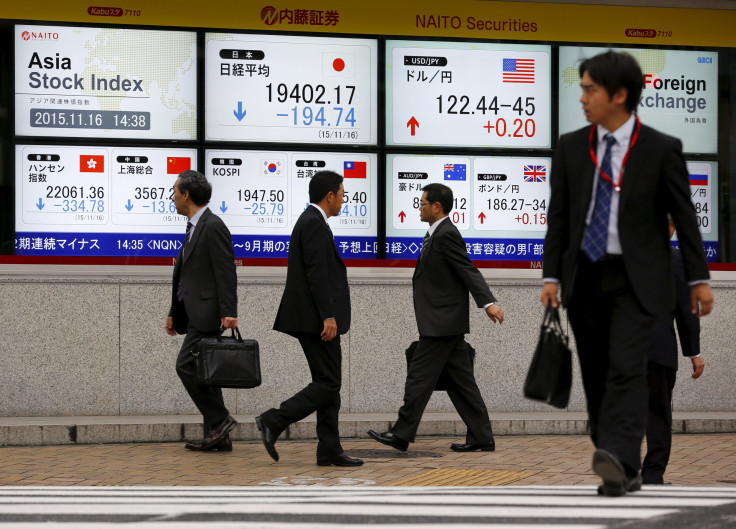Asian Shares Tentative, Dollar Shines On Fed Outlook

By Hideyuki Sano
TOKYO (Reuters) -- Asian share markets were cautious on Wednesday as another bomb scare in Europe days after the deadly Paris attacks left investors in a contemplative mood, giving a boost to safe-haven U.S. bonds and the dollar.
The greenback held firm at seven-month highs against a basket of currencies as U.S. economic data also backed up the case for December interest rate hike.
MSCI's broadest index of Asia-Pacific shares outside Japan were little changed, while a softer yen helped Japan's Nikkei rise 1.0 percent.
Wall Street shares ceded earlier gains to end almost flat on Tuesday after German authorities called off a soccer game which German Chancellor Angel Merkel was due to attend, citing threats of bombing, sparking fears of another attack coming only days after the deadly assault in Paris.
"Coming less than a week after the incident in Paris, it would be a natural reaction, even though consensus seems to be growing earlier that the impact of the terror attack would be limited," said Hirokazu Kabeya, chief global strategist at Daiwa Securities.
"Markets are likely to be going back and forth for now," he added.
U.S. Treasuries also bounced back on safety bids, with the 10-year yield slipping to 2.273 percent from day's high of 2.313 percent.
Earlier on Tuesday, U.S. economic data affirmed a solid economic picture, supporting the case for the Federal Reserve to raise interest rates in December.
U.S. consumer prices increased in October from the previous month after two straight months of declines, putting annual core inflation at 1.9 percent.
Industrial output fell short of market expectations but the output in the manufacturing sector posted a solid increase.
All of these helped to support the dollar against other major currencies, lifting its index against six major currencies to the highest level in seven months.
The dollar index rose 0.2 percent on Tuesday to 99.63, hitting a high of 99.745 at one point, coming within sight of its 12-year peak of 100.39 set in March.
Against the yen, the dollar rose to 123.49 yen, edging near a 2-1/2-month high of 123.60 yen hit on Nov. 9.
The euro also slipped to $1.0630, a seven-month low, as the common currency continues to be undermined by expectations that the European Central Bank will take fresh monetary easing steps next month.
The dollar's strength was even more impressive against precious metals and commodities.
Gold hit a 5-1/2-year low of $1,065.30 per ounce, extending its fall this year to 10 percent. It last stood at $1,070.
Copper continued to suffer, hitting a 6-1/2-year low of $4,590 a tonne, a decline of 27 percent year-to-date.
Oil prices rebounded a tad after data showed an unexpected stockpile draw for last week.
U.S. crude futures last stood at $40.94 per barrel, off Tuesday's low of $40.58.
Still, they remained not far from 6-1/2-year lows hit in August on concerns about a global supply glut.
The global benchmark Brent last stood at $43.99, less than $2 away from its August low of $42.23.
Most emerging market currencies, however, fared better, staying well above multi-year lows hit earlier this year.
The Brazilian real stood at 3.81 to the dollar, off its record low of 4.2482 hit in September.
One exception was the Chilean peso, which hit a 12-1/2-year low on the slide in copper prices.
(Editing by Shri Navaratnam)
© Copyright Thomson Reuters 2024. All rights reserved.





















